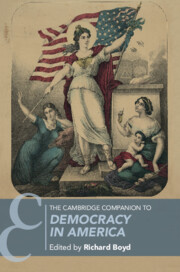Book contents
- The Cambridge Companion to Democracy in America
- Series page
- The Cambridge Companion to Democracy in America
- Copyright page
- Contents
- Contributors
- Acknowledgments
- Chronology
- Abbreviations of Tocqueville’s Major Works
- Introduction
- Part I Sources and Contexts
- Part II Receptions and Applications
- Part III Genres and Themes
- 9 “Ideas for the Intellect and Emotions for the Heart”
- 10 Tocquevillean Association and the Market
- 11 Tocqueville on the Federal Constitution
- 12 Religion in Democracy in America
- 13 Tocqueville’s Puritans
- Part IV Democracy’s Enduring Challenges
- References
- Index
- Series page
12 - Religion in Democracy in America
from Part III - Genres and Themes
Published online by Cambridge University Press: 23 March 2022
- The Cambridge Companion to Democracy in America
- Series page
- The Cambridge Companion to Democracy in America
- Copyright page
- Contents
- Contributors
- Acknowledgments
- Chronology
- Abbreviations of Tocqueville’s Major Works
- Introduction
- Part I Sources and Contexts
- Part II Receptions and Applications
- Part III Genres and Themes
- 9 “Ideas for the Intellect and Emotions for the Heart”
- 10 Tocquevillean Association and the Market
- 11 Tocqueville on the Federal Constitution
- 12 Religion in Democracy in America
- 13 Tocqueville’s Puritans
- Part IV Democracy’s Enduring Challenges
- References
- Index
- Series page
Summary
This chapter explores the relationship between democracy and Christianity through the lens of Alexis de Tocqueville’s Democracy in America. As Tocqueville noted, unlike the European nations of his own day where the forces of democracy and proponents of religion were at odds, the United States in the 1830s is characterized by a harmony between religion and democracy. Tocqueville sees a number of ways in which these two forces may be mutually supportive. First and most importantly, Tocqueville regards Christianity and its affirmation of the equality of all human beings as an important source for democracy. He also finds American religion to be supportive of democratic government in the sense that it counters democratic tendencies toward cultural mediocrity, the tyranny of the majority, the pathologies of individualism, and secular materialism. Not only is Christianity necessary for the formation of democratic governments, in Tocqueville’s view, but their long-term flourishing requires a certain moderation on the part of religious believers. While it might seem that Christianity is the only religion capable of preserving democracy, a closer reading of Democracy in America would suggest otherwise.
Keywords
- Type
- Chapter
- Information
- The Cambridge Companion to Democracy in America , pp. 327 - 346Publisher: Cambridge University PressPrint publication year: 2022

